Conversational AI in Retail: Revolutionizing Customer Experience
If you ask retailers about the top secret behind their success, you will get the same answer 9 out of 10 times: Enhanced consumer experience. And conversational AI has been the driving force behind consumer engagement for the recent few years, particularly in retail, with most retail shopping now happening online.

In this article, we will discuss the potential of conversational AI in retail and explore its impact in revolutionizing customer experience. Let's get started!
- Part 1 : The Rise of Conversational AI in Retail
- Part 2 : The Impact of Retail Conversational AI on Customer Experience
- Part 3 : What are the Benefits Offered by Retail Conversational AI
- Part 4 : Real-World Examples of Conversational AI in Retail
- Part 5 : The Future of Conversational AI for Retail
- Part 6 : Leverage Conversational AI in Retail
- Part 7 : FAQs about Conversational AI in Retail
Part 1: The Rise of Conversational AI in Retail
Artificial intelligence (AI) is booming in the retail industry, and conversational AI chatbots are rapidly replacing human chat support agents in the retail and banking sectors. The projected AI chatbot-based sales are expected to reach $112 billion in 2023 with a CAGR of 98%. Similarly, another survey showed nearly 37% of CEOs agreed that AI-powered solutions improve consumer experiences.
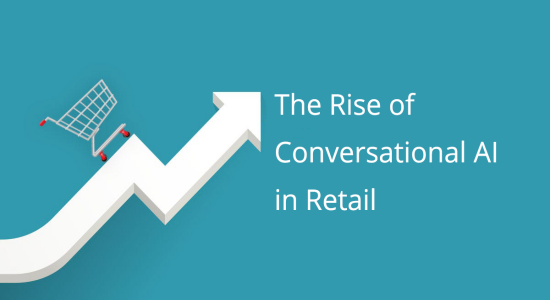
Part 2: The Impact of Retail Conversational AI on Customer Experience
Conversational AI technology has a significant role to play in bringing together customers and retailers. Retail Conversational AI enhances customer experience and revolutionize the retail industry in different ways, such as:
24/7 Customer Support
Retail customers demand round-the-clock assistance to get their queries resolved quickly. Retailers can ensure 24/7 customer support by integrating chatbots and virtual assistance powered by conversational AI.
These tools can understand and respond to customers’ queries efficiently and offer continuous support. Eventually, they help retailers improve their recognition and ensure that customers feel supported and valued at all times.
Personalized Recommendations
Delivering highly personalized product recommendations is a proven method to increase retail sales. Conversational AI tools can better analyze customer preferences, browser navigation, and search history. They can generate tailored suggestions based on this data and encourage customers to make a purchase.
Besides, AI chatbots can ask questions regarding customers’ preferences in conversations. As a result, retailers can create a more targeted and relevant shopping experience for their customers.
Multilingual Support
Multilingual support is crucial to reach and engage customers in today’s globalized marketplace. Conversational AI facilitates seamless multilingual support by understanding and communicating various languages.
Similarly, AI-powered chatbots and virtual assistants eliminate language barriers and enable retailers to expand their reach of retailers in multicultural markets.
Voice-enabled Shopping
Voice-enabled shopping is a rapidly emerging trend in the retail industry. Thanks to retail conversational AI technology which enables customers to interact with virtual assistants using voice commands.
Moreover, voice-enabled shopping adds convenience and accessibility and helps retailers create a more engaging and effortless customer experience.
Integration of Offline and Online Retail
A recent CBRE report revealed that purely online retailers still account for a small percentage of all retail transactions, while brick-and-mortar sales account for nearly half of transactions. It is clear that both online and offline stores are essential when it comes to retail. By ensuring that customers are provided with a standardized online and offline experience, conversational AI can play a key role in bridging the gap between the two.
Part 3: What are the Benefits Offered by Retail Conversational AI
Conversational AI chatbot in retail is useful for streamlining retail operations. Given below are some of the exclusive benefits businesses can get by leveraging retail conversational AI.
Seamless Inventory Management
Inventory management is a time-consuming and hectic task unless manual processes are replaced with cutting-edge solutions. Retail conversational AI chatbots automate inventory tracking and management and provide retailers with real-time insights into inventory levels.
By optimizing stock levels, reducing overstocking or understocking, and improving inventory forecasting accuracy, retailers can streamline the customer experience and achieve higher satisfaction.
Optimized Sales and Marketing
AI-powered chatbots and virtual assistants are great ways to understand consumer behavior and preferences. Retailers can use conversational chatbots to gather and analyze this data and deliver targeted promotional offers tailored to each market segment.
Hence, by proactive engagement and personalized interactions, retailers can use conversational AI to enhance and generate more leads and win customers’ loyalty.
Staff Training and Development
Another key area where conversational AI plays a crucial role is employee training and development. Retailers can use AI-powered virtual assistants to simulate various scenarios and provide interactive training experiences to their staff. Besides, personnel can learn how to respond to customer inquiries effectively, handle angry clients, or satisfy buyers.
Consequently, conversational AI can enhance employee knowledge, boost their confidence, and result in remarkable growth in sales.
Part 4: Real-World Examples of Conversational AI in Retail
You must interact with a conversational AI chatbot while shopping online at least once in your life. See below some of the real-world examples of retail conversational AI:
1Sephora's Virtual Artist
Well-known beauty retailer Sephora offers a Virtual Artist feature powered by conversational AI. With this feature, customers can virtually apply different makeup products using augmented reality technology. Besides, the Virtual Artist also guides customers and suggests complementary products based on their preferences.

2Starbucks' Chatbot
Starbucks introduced My Starbucks Barista, an AI-powered virtual assistant that lets consumers place orders in human-like natural conversations. You can chat with My Starbucks Barista, choose your preferences, and add the pickup location to simplify the ordering process.
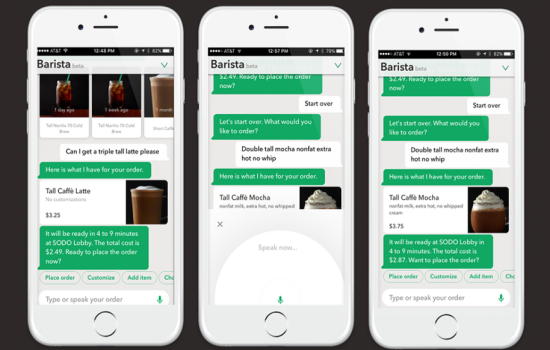
3H&M's Style Advisor
H&M is a popular fashion retail brand that recently implemented a conversational Style Advisor feature. It provides customers with information about their style preferences, occasion, and desired outfit. Based on the conversations, the AI algorithm offers personalized outfit recommendations and suggests available H&M products.
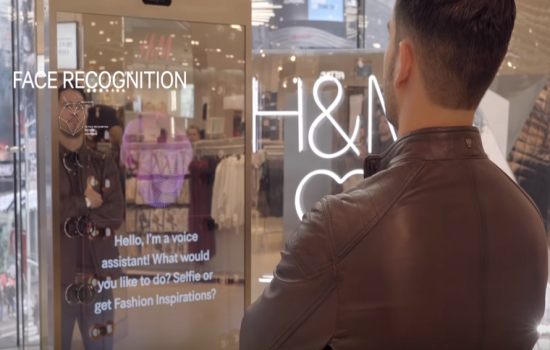
4Nordstrom's Personal Stylist Chatbot
Nordstrom's Personal Stylist program leverages conversational AI technology to engage with customers and schedule appointments with personal stylists. Besides, this AI chatbot offers style recommendations and personal advice on the latest fashion trends.
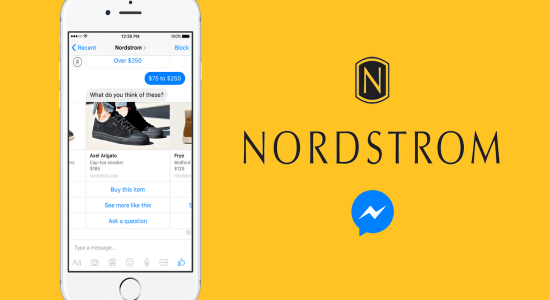
5Walmart Store Assistant
The retail giant, Walmart, uses Google Assistant to enable voice shopping through its website and mobile apps. Customers can use voice commands to add items to their shopping cart and check out.

Part 5: The Future of Conversational AI for Retail
Amid changing consumer behaviors and technological advancements, retailers have realized the importance of conversational AI. Today, growth-oriented retailer brands are automating their processes to stay ahead of their competitors and offer personalized customer experiences.
Hence, we will see more applications of conversational AI to transform retail operations in the future.
Some of the trends to watch out for in 2023 would be:
- Integration of Natural Language Processing (NLP) Tools
The race of conversational AI or NLP tools like ChatGPT, Bard, and Bing AI is getting more and more intense. Businesses across diverse sectors, including retail, are now integrating these tools to streamline consumer interactions and improve their customer services.

- Voice Assistants and Smart Devices
The integration of voice assistants and smart devices with conversational AI tools will be a remarkable step for the retail sector. This integration would enable customers to interact with AI chatbots through voice commands and make purchases without typing.

- Emotional Intelligence and Sentimental Analysis
One drawback of retail conversational AI tools is that they cannot reflect emotions in conversations like humans. To overcome this flaw, future AI models will focus on developing emotional intelligence and sentiment analysis capabilities. This will help them better understand customer emotions and build a strong connection between customers and brands.

The challenges of conversational AI in retail
There is growing concern that the rise of automation and AI-driven algorithms may be taking away jobs. While there have been widespread layoffs in the retail sector, a definitive causal link between increased automation and job loss has yet to be established.
However, if this trend persists, the future of Conversational AI in the industry could be at risk. Many experts argue that fewer people are interested in retail jobs (e.g., cashiers), as evidenced by the Great Resignation of 2021, where a majority of those who quit were from the retail sector due to low pay and poor working conditions.
To ensure a thriving future, the retail industry must find the right balance between automation and fostering a healthy work environment. By combining the efforts of content employees with Artificial Intelligence, the industry can offer better customer service, improved management, and more cost-effective solutions. Failing to do so may lead to increased opposition towards AI, particularly Conversational AI, creating a challenging situation for all parties involved.
Part 6: Leverage Conversational AI in Retail
ChatInsight provides AI chatbots made especially for retail stores. It provides proactive customer service across several platforms and efficiently automates customer support. With the usage of artificial intelligence and NLP recognition engine for user conversation, this chatbot is the greatest in the retail industry.
Businesses across different markets are now implementing ChatInsight AI bots in the retail sector to offer round-the-clock customer support, analyze consumer behavior, and send personalized recommendations based on clients’ preferences. Besides, AI chatbots and virtual assistants offer multilingual support and voice-enabled shopping that contributes to business growth.
In the future, we will see more developments in conversational AI which will expand their applications across more sectors.




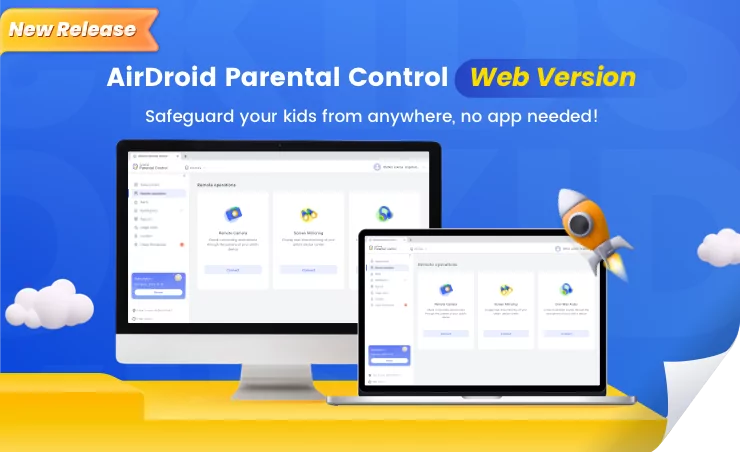






Leave a Reply.